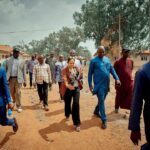By Felicia Imohimi
The National Agricultural Development Fund (NADF) and German Development Cooperation (GIZ) have reaffirmed their commitment to transforming Nigeria’s agriculture through gender-inclusive and climate-smart financing models.
The two organisations made the commitment at the Validation Workshop on Climate-Smart and Gender-Inclusive Financing in Abuja.
The workshop, which featured key stakeholders, was to finalise a financing framework aimed at providing millions of women and youths with access to agricultural support systems tailored to meet their unique needs.
Sen. Abubakar Kyari, Minister of Agriculture and Food Security, said that the initiative was more than just documentation but embodiment of a commitment to fostering resilience, inclusivity and prosperity within our food systems.
He stressed the importance of integrating digital tools and financial literacy to reach underserved groups.
“Inclusion demands that we think beyond traditional financial instruments.
“We must explore innovative approaches; leveraging digital platforms that can provide tailored financial products that meet the unique needs of these groups.
“Our pursuit of food security is intrinsically linked to our capacity to provide farmers with the necessary tools and resources to adapt to climate-induced challenges,” he said.
Kyari, in reference to recent flood disasters, emphasised that there was urgency of integrating risk management and anticipatory action into agricultural systems.
The Executive Secretary of NADF, Mohammed Ibrahim, said their mission was to unlock and deploy financing that worked for every Nigerian farmer, irrespective of where they are or barriers they face.
The workshop, according to him, builds on a previous session held in November where stakeholders helped craft the initial draft of the financing model.
“This second phase is focused on validation, product refinement and setting clear steps for implementation.
“This is more than validation, it is co-creation of a financing model that meets farmers where they are and takes them to where they deserve to be.
“I call on stakeholders to imagine new delivery models.
“Can we bundle financing, insurance, and mechanisation into one service—pay-as-you-plant? Can digital platforms deliver microloans to women via mobile wallets?.
“I call on all participants to take ownership of the process,” he said.
In her keynote address, Minister of Women Affairs, Imaan Sulaiman-Ibrahim, called for urgent and inclusive financial systems to empower women and build resilience against growing impacts of climate change.
“Women constitute between 70 per cent to 75 per cent of Nigeria’s agricultural workforce.
“They produce about 70 per cent to 80 per cent of the nation’s food, yet they receive only a small fraction of credit and land allocated to small-scale farmers.
“We must collectively work to dismantle the systemic barriers that have historically hindered women’s full participation and ensure a level playing field where their contributions are recognised and supported,” she said.
Dr Andrea Ruediger, GIZ representative, reaffirmed Germany’s long-standing partnership with Nigeria in agricultural transformation, identified food systems as the backbone of livelihoods, economies and environment.
“I urge stakeholders to implement the recommendations outlined in the newly validated framework.
“These include developing targeted financial products, increasing access to non-collateralised loans, enhancing institutional coordination and promoting climate-smart agriculture,” she said.
Sen. Saliu Mustapha, Chairman, Senate Committee on Agriculture Production and Rural Development, identified technology as key to food sustainability.
Prof. Nentawe Yilwatda, Minister of Humanitarian Affairs and Poverty Reduction, called for urgent attention to Nigeria’s most vulnerable groups, particularly displaced persons, in national development policies.
“We have over five million Nigerians displaced across the country, which is more than the population of most states. Yet, they are rarely at the centre of our national discourse,” he said.
The framework, jointly developed by NADF and GIZ, seeks to shift agricultural financing from traditional credit systems to a holistic approach that includes mechanisation, extension services, digital tools, advisory support, and risk-sharing mechanisms. (NAN)(www.nannews.ng)
Edited by Kadiri Abdulrahman












